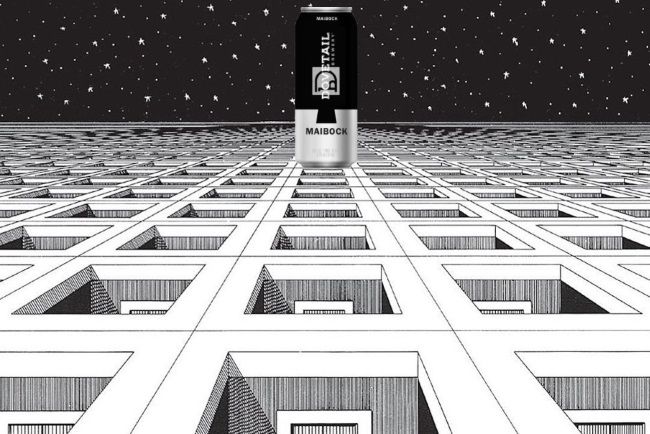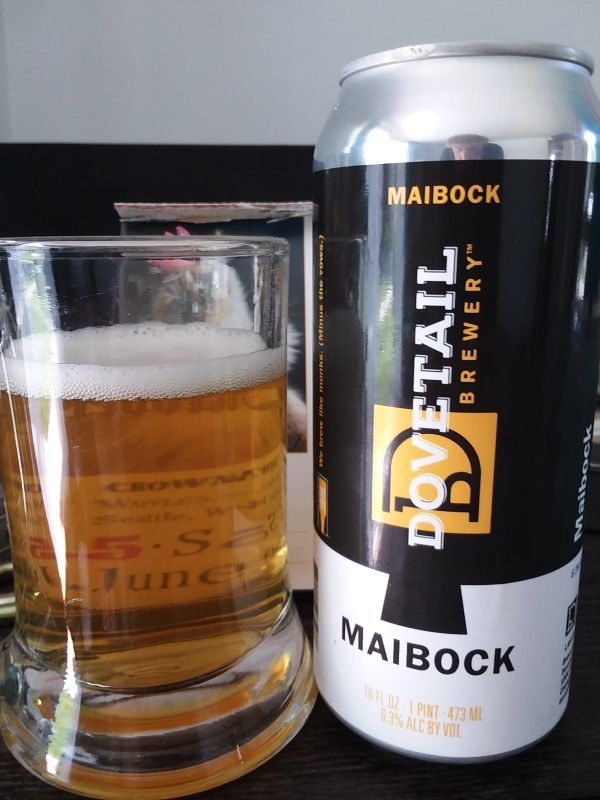The Maibock is one of those liminal beer styles. It's doesn't live in the realm of bold, heady brews that are able to fend off the -20° (-40° windchill) cold and snow of January.
And it's not an easy going, sylph-like brew that is perfect for a 90° day in the sun.
As its name implies, the Maibock is a beer for that time of year when the days
are much milder than those of the Upper Midwestern fimbulwinter from which you have just emerged but
still chilly at night to remind you that you're not out of the woods yet. It's
a spring treat, perfect for sitting around the fire as your maple sap boils.
Personally, I am rather fond of Maibocks. For one, it was
the first style of microbrew I can recall drinking back in 1991. For another,
their appearance in stores is a bit like seeing a robin for the first time
since the previous year: it heralds the arrival of spring.
This was the first year the Maibock from Chicago's Dovetail Brewery would be available here in Madison and I was greatly looking forward to
it. The other beers that I have had from them have been uniformly excellent. They
reliably decoct to perfection, bestowing upon their beers that toasty-bready
flavor that I fell in love with while drinking the lagers my friend smuggled in from
Germany back in 1990. Well, I think they
do, anyway. Either that or they use melanoidin malt which apparently obviates
the need to decoct. Since Dovetail brag about decocting their beers on Twitter,
I am going to discount the custom malt idea.
Although I scoured the internet from end to end, I was
unable to find any evidence of who invented the Maibock as we know it today and
when they did so. The bock style goes back to the 14th century or
thereabouts and featured lots of malty sweetness, a dark color, a touch of
hops, and a good kick**. It's for keeping the cold at bay or sustaining oneself
through Lent. The going theory is that sometime during the 1800s a someone or someones had an epiphany which led to a Reese's Peanut Butter Cup moment that
would be perfect for James Burke to put into an episode of Connections.
I can just see Burke strolling down the shadowy cloisters of some old
monastery in Germany passing by serious looking monks who have taken a vow of silence as he intones,
"The bock beer began life here in the northern German city of Einbeck in
the 14th century. But by the 17th century the style had
migrated south." The tonsured men then proceed to cast sideways glances at our inquisitive host. We then cut to Burke walking the streets of Vienna.
"Fast forward to the 1830s when a chap called Anton Dreher in the suburbs
of Vienna decided to combine the pale malts he encountered during his travels in
England with the bottom-fermenting yeast he got from his friend Gabriel
Sedlmayr in Munich who ran a little brewery you may have heard of – Spaten. He
ended up inventing the pale lager." Cut to a big-breasted blonde with an armful of steinkrugs.
And so on. What it comes down to is that someone thought it would be a good idea to take
the bock that everyone knew and liked and cross it with the new pale lager that was
setting the brewing world on fire and we got the Maibock, a.k.a. – helles (pale)
bock. Pale in color, not quite as much alcohol as a traditional bock, not quite
as sweet either, and generally with a bit more hops.
Dovetail's Maibock is a beautiful light gold that's clear as day. My pour produced a big, frothy, white head that went away rather quickly. However, the small head in the photo above is the result of me scrambling to find a good spot to take a picture for too long. It looked a lot better about 15 seconds prior to this photograph. And you can't see all of the bubbles making their way up. It looked mighty fine.
Smelling this beer brought me back to the days before 2018 driving by the Sara Lee bakery over on the 3400 block of East Washington here in Madison. If you went by at the right time, your nose was inundated with the aroma of freshly baked bread and this is what this Maibock smelled like in large measure. Simply wonderful. There was also a honey/fruity sweetness and a herbal/floral smell from the hops.
The first thing I noticed when drinking this beer was the toasted bread/melanoidiny goodness. The day someone figured out how to put that flavor into beer was a great day for humanity and we should all have a day off from work to celebrate. At least I should, anyway. John Stuart Mill would definitely have classified it as a higher pleasure. There was a honeyed sweetness, some herbal tasting hops, and some good fizz to be had as well.
On the finish some mild bitterness came onto the scene and the honey flavor took on floral overtones.
From the first sip it was apparent that Dovetail's Maibock would make its way into my top 2 microbrewed helles bocks. With plenty of that Maillard reacated toasty tastiness, how could it not? While there was the expected honey sweetness, it wasn't too much. I also really appreciated the herbal/floral tastes from the hops. My only gripe is simply that I wish there was more hoppiness, just a little more sumpin' sumpin' to go up against the sweetness. Maybe there is if drunk fresh. That experiment will have to wait for next year, however.
Despite the folks at Dovetail not brewing their Maibock to my exact specifications, I will grudgingly admit that it's still a great beer.
Junk food pairing: With toastiness the key word here, get family sized box of Extra Toasty Cheez-Its to pair with your Maibock. You can drown in melanoidin gluttony.
**This may not be an accurate description of a bock bier from the Late Middle Ages.


No comments:
Post a Comment